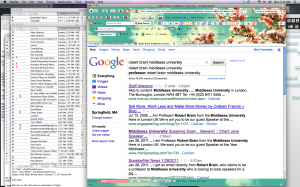Why You Don’t Have Access to Your Own Facebook Data
Adam Boettiger, someone I’ve known online and respected for more than a decade, just put up a very provocative post speculating why Facebook, which clearly spends a lot of energy interacting with its user data, won’t make any of that data available in a meaningful way to the user him/herself.
He’s not asking for other people’s data, but to know things like who has spent how long on his page within a period of time. Why? So he can more effectively reach out to the people who are validating him with the gift their time.
Cultivating these relationships is certainly a worthy goal. I have certainly built relationships with people who I know because they comment frequently on my blog or my Facebook profile, or because they retweet or engage with me on social media. On a recent trip to Chicago, I took a couple of hours to have coffee with someone I know only through his reaching out to me on Twitter. Now that person has gone from someone who thinks I’m important on Twitter to someone I’d call a friend, and I welcome that. (Shout out: @WayneBuckhanan)—and he’s someone who I probably wouldn’t have paid attention to just reading his profile.
But on the other hand, both from Facebook’s vantage and from my own as a Facebook user, I’m not all that concerned (of course, I’m not a very heavy user of Facebook).
Looking at it from FB’s perspective: I assumed going in that there is no true privacy on Facebook. In fact, there’s no true privacy online, including one-to-one private e-mail. All of us who use social media have made a choice, conscious or not, that the value we get out of participating is worth the sacrifice of privacy. Those of us who are smart never post anything online that we would be embarrassed to see in our hometown newspapers. My son actually changed his profile name to something completely made up, because he doesn’t want anything he posts (and his posts are clean) to haunt him later.
And I recognize that Facebook’s business model and valuation are based heavily on being able to sift the galaxies (mountain seems far too puny a metaphor) of data for a wide range of purposes, from displaying ads based on very narrow interest slices to suggesting friends. They’ve got enormous computing power, and yes, they ought to share an individual’s data with that individual.
But as a user…do I really care that I don’t have that data? Would I have the time to deal with it if I did have it? Both questions get a no vote from me. Heck, I don’t even have time to check out the profile pages of every new follower on all the social media; that would be many hours a week. I check out a random few, and I feel a bit guilty about the rest. But I also have to get my work done, andmenwhile there’s the little matter of 300 new e-mails every day.
The way I use Facebook is to dip in to my profile occasionally and Like or comment on a few things that catch my eye, and follow a quick swath of what’s happening to people in my world. Yes, I’m aware that I could be much more strategic with Facebook; certainly, people like Mari Smith have been very successful using it for business. But I’ve chosen Twitter as my primary social media platform, followed by LinkedIn (where I participate in a lot of discussion groups, and where those discussion groups give me much more leverage than Facebook groups. The friends set on Facebook is too randomized. Even something as simple as sending a message to everyone I’ve identified as part of a particular interest group (and I do categorize my friends) is too much work for the return in most cases, because of FB’s ridiculous limit of 20 people getting the same message at once, and suspending accounts of people who send too many batches of messages (or even accept too many friend requests) too close together. And because there’s no e-mail channel, I rarely participate in discussions on someone’s fan page. On LinkedIn, when I post to a discussion list, everyone on that list gets an e-mail notification. Not true with FB pages I’ve liked. This allows me to be promiscuous with the Like button, which I could never do if every page sent me a stream of mail—but it also means the Like button is essentially meaningless to me.
And as Adam himself notes, there are lots of other ways to interact on FB besides spending time on a profile.

